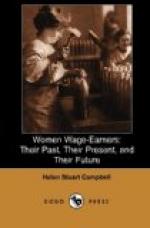The Report of the New York Bureau of Labor for 1885 contains a mass of evidence so fearful in its character, and demonstrating conditions of life so tragic for the worker, and so shameful on the part of the employer, that general attention was for the time aroused. It is impossible here to make more than this general statement referring all readers to the report itself for full detail. Thousands herded together in tenement houses and received a daily wage of from twenty-five to sixty cents, the day’s labor being often sixteen hours long. “The Bitter Cry of Outcast London” found its parallel here, nor has there been any diminution of the numbers involved, though at some points conditions have been improved. But the facts recorded in the report are practically the same to-day; and the income of many workers falls below two dollars a week, from which sum food, clothing, light, fuel, and rent are to be provided for. The sum and essence of every wrong and injustice that can hedge about the worker is found at this point, and remains a problem to every worker among the poor, the solving of which will mean the solution of the whole labor question.
New Jersey reports have from the beginning followed the phases of the labor movement with a keen intelligence and interest. They give general conditions as much the same as those of New York State. The wage-rate is but $5; and Newark especially, a city which is filled with manufacturing establishments of every order, reproduces some of the evil conditions of New York City, though in far less degree. Taking the State as a whole, legislation has done much to protect the worker, and other reforms are persistently urged by the bureau. They are needed. In the official report of conditions among the linen-thread spinners of Paterson we find: “In one branch of this industry women are compelled to stand on a stone floor in water the year round, most of the time barefoot, with a spray of water from a revolving cylinder flying constantly against the breast; and the coldest night in winter, as well as the warmest in summer, these poor creatures must go to their homes with water dripping from their underclothing along their path, because there could not be space or a few moments allowed them wherein to change their clothing."[40]
Thus much for the East; and we turn to the West, where some of the most practical and suggestive forms of investigation are now in full operation.
FOOTNOTES:
[39] Third Annual Report of the Commissioner of Industrial Statistics of Rhode Island, 1889, p. 22.
[40] Report of the Bureau of Labor for the State of New Jersey, 1888.
X.
GENERAL CONDITIONS IN THE WESTERN STATES.




